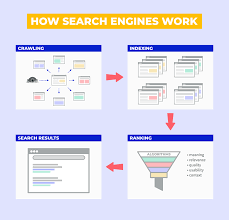
Search engines have now become a very important part of our lives. Whether you’re looking for a new recipe, researching a topic for school, or trying to find a local business, chances are you’ll turn to a search engine like Google, Bing, or Yahoo to help you find the information you need. But have you ever stopped to wonder how these search engines work, and how they’re able to deliver such accurate and relevant results? In this blog post, we’ll take a closer look at how search engines work and how they rank websites, so you can better understand how to optimize your website with SEO services Lahore.
Table of Contents
- How search engines work
- How search engines rank websites
- Common misconceptions about search engines
- Conclusion
How search engines work
Search engines work by using a complex process that involves crawling, indexing, and ranking web pages. Here’s the detailed explanation
Crawling
Search engines use automated programs called “crawlers” or “spiders” to browse the web and find web pages to index. These crawlers follow links from one page to another and collect data on every page they visit.
Indexing
Once a search engine crawler finds a web page, it reads and analyzes the page’s content and metadata (such as title tags and descriptions) to understand what the page is about. The search engine then adds the page to its index, which is a huge database of web pages that the search engine has analyzed and stored.
Ranking
When someone enters a search query into a search engine, the search engine uses an algorithm to determine which web pages in its index are the most relevant to the query. The algorithm takes into account a variety of factors, such as the content and structure of the web page, the website’s reputation and authority, and how closely the content matches the user’s search query.
Displaying results
Finally, the search engine displays the most relevant results to the user, usually in a list format with the most relevant result at the top of the page.
It’s important to note that search engines are constantly updating and refining their algorithms to improve the accuracy and relevance of search results. This means that the factors that influence search rankings can change over time, and staying up-to-date with these changes is important for anyone looking to optimize their website for better search engine visibility.
How search engines rank websites
On-page factors are related to the content and structure of a website, such as the relevance of the content to the search query, the quality and quantity of the content, the use of keywords and meta tags, and the overall user experience of the website. Off-page factors that search engines consider include the number and quality of external links pointing to a website, the reputation and authority of the linking domains, and social signals such as likes and shares on social media. Search engines use these off-page factors as indicators of the website’s popularity and authority within its industry or niche. In addition to on-page and off-page factors, search engines also use complex algorithms to analyze user behavior and personalize search results. For example, a search engine may prioritize websites that are frequently visited by users in a particular location, or that have received positive reviews from users
Common misconceptions about search engines
SEO is all about tricking search engines: Some people believe that search engine optimization (SEO) is all about finding ways to manipulate search engine algorithms to boost rankings. However, this approach, known as “black hat” SEO, can result in penalties or even get your website banned from search engines. Effective SEO involves creating high-quality, relevant content and optimizing your website’s structure and user experience to make it easy for search engines to crawl and understand.
Keywords are the only important factor
While keywords are an important on-page factor, they are not the only factor that search engines consider when ranking websites. Search engines are getting better at understanding the context and intent behind search queries, which means that content that is well-written, informative, and engaging is becoming increasingly important for ranking well in search results.
Paid search results are always better
While paid search advertising can be a valuable tool for promoting your website, it’s important to remember that paid search results are separate from organic search results. Paid results are labeled as ads or CPC services in Pakistan and are often less trusted by users than organic results, which are earned based on the relevance and quality of the content.
Black hat SEO tactics are not sustainable in the long term because search engines continually update their algorithms to detect and penalize such tactics, which can result in lower search rank or even a ban from search engine result pages(SERP).
Conclusion
Search engines play a critical role in how we find information and navigate the web. By understanding how search engines work and how they rank websites, you can develop an effective SEO strategy and improve your website’s visibility in search results. It’s important to avoid common misconceptions about search engines, such as the idea that SEO is all about tricking search engines, and instead focus on creating high-quality, relevant content and optimizing your website’s structure and user experience. By taking a long-term, sustainable approach to SEO, you can build a strong online presence and attract more visitors to your website.
